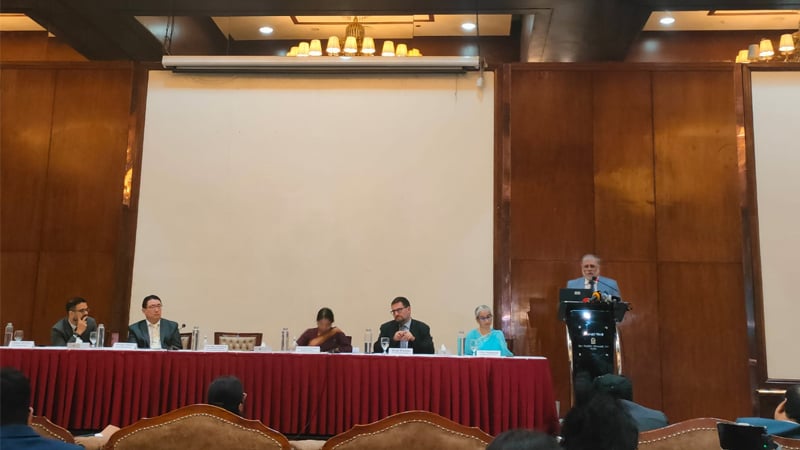
Bangladesh Ranks Second in Global Temperature Rise, Faces Dire Health and Economic Consequences
Published: 2025-09-16 13:24:38 | Source: Tahirul Islam, Special Correspondent, Dhaka.
Dhaka is rapidly becoming a climate “hotspot” as Bangladesh now ranks second in the world for the rate of temperature rise, according to a new research report unveiled on Tuesday at a program titled “Impact of Heat on Bangladesh’s Health and Economy” at the Pan Pacific Sonargaon Hotel, Dhaka.
The event was attended by Syeda Rizwana Hasan, Adviser to the Ministry of Environment, Forest and Climate Change, as the chief guest. Special guest Professor Dr. Syedur Rahman, Special Assistant to the Chief Adviser, also spoke. The keynote paper was jointly presented by World Bank Senior Operations Officer Iffat Mahmud and Senior Health Specialist Wamek A. Raja.
The findings show that between 1980 and 2023, Bangladesh’s maximum average temperature rose by 1.1°C, while the “felt temperature” surged by 4.5°C. The World Meteorological Organization reported that 2015–2023 marked the nine hottest years globally, with Dhaka recording the steepest rise. In the capital alone, the average temperature increased by 1.4°C during this period—well above the national average.
Experts linked the crisis to unplanned urbanization, indiscriminate tree-felling, and concrete-heavy development, which have worsened heat intensity.
Rising Health Risks
The World Bank’s 2024 survey revealed alarming health impacts of rising heat. Chronic cough, affecting 3.3% of people in winter, nearly doubled to 6% in summer. At temperatures above 30°C, risks increase by 22.7%. Similarly, heat exhaustion disproportionately affects workers and the elderly, with risks rising 26.5% above 35°C.
Diarrheal diseases also surge in summer, with infection rates at 4.4%, compared to just 1.8% in winter—affecting women and children under five the most. At 35°C or higher, the risk rises by 47.7%.
Mental health is also under threat. Depression is reported in 20% of cases during summer, compared to 16.2% in winter, while anxiety rises to 10% in summer versus 8.3% in winter. At extreme heat levels, depression jumps by 23.8% and anxiety by 37.1%.
Economic Losses
The economic fallout is equally severe. In 2024 alone, Bangladesh lost workdays equivalent to Tk 21,000 crore ($1.33–$1.78 billion), accounting for 0.3–0.4% of GDP. Projections suggest that by 2030, heat-related productivity loss could climb to 4.9% of GDP. Productivity of laborers drops sharply once temperatures exceed 37°C.
Recommendations
The report proposed five urgent measures:
Strengthening national preparedness with coordinated heatwave response strategies.
Equipping the health sector to handle heat-related emergencies.
Adopting preventive technologies such as heat-resilient housing and shaded work environments.
Improving weather data systems to provide reliable forecasts and early warnings.
Mobilizing international cooperation and financing for climate adaptation.
Experts cautioned that heatwaves are no longer just an environmental issue but a global health crisis—posing an existential threat to vulnerable countries like Bangladesh. They emphasized that climate-conscious urban planning, robust healthcare, green infrastructure, and strong policymaking are essential. With political will and international support, Bangladesh can still navigate this looming crisis.
← Back to Home
The event was attended by Syeda Rizwana Hasan, Adviser to the Ministry of Environment, Forest and Climate Change, as the chief guest. Special guest Professor Dr. Syedur Rahman, Special Assistant to the Chief Adviser, also spoke. The keynote paper was jointly presented by World Bank Senior Operations Officer Iffat Mahmud and Senior Health Specialist Wamek A. Raja.
The findings show that between 1980 and 2023, Bangladesh’s maximum average temperature rose by 1.1°C, while the “felt temperature” surged by 4.5°C. The World Meteorological Organization reported that 2015–2023 marked the nine hottest years globally, with Dhaka recording the steepest rise. In the capital alone, the average temperature increased by 1.4°C during this period—well above the national average.
Experts linked the crisis to unplanned urbanization, indiscriminate tree-felling, and concrete-heavy development, which have worsened heat intensity.
Rising Health Risks
The World Bank’s 2024 survey revealed alarming health impacts of rising heat. Chronic cough, affecting 3.3% of people in winter, nearly doubled to 6% in summer. At temperatures above 30°C, risks increase by 22.7%. Similarly, heat exhaustion disproportionately affects workers and the elderly, with risks rising 26.5% above 35°C.
Diarrheal diseases also surge in summer, with infection rates at 4.4%, compared to just 1.8% in winter—affecting women and children under five the most. At 35°C or higher, the risk rises by 47.7%.
Mental health is also under threat. Depression is reported in 20% of cases during summer, compared to 16.2% in winter, while anxiety rises to 10% in summer versus 8.3% in winter. At extreme heat levels, depression jumps by 23.8% and anxiety by 37.1%.
Economic Losses
The economic fallout is equally severe. In 2024 alone, Bangladesh lost workdays equivalent to Tk 21,000 crore ($1.33–$1.78 billion), accounting for 0.3–0.4% of GDP. Projections suggest that by 2030, heat-related productivity loss could climb to 4.9% of GDP. Productivity of laborers drops sharply once temperatures exceed 37°C.
Recommendations
The report proposed five urgent measures:
Strengthening national preparedness with coordinated heatwave response strategies.
Equipping the health sector to handle heat-related emergencies.
Adopting preventive technologies such as heat-resilient housing and shaded work environments.
Improving weather data systems to provide reliable forecasts and early warnings.
Mobilizing international cooperation and financing for climate adaptation.
Experts cautioned that heatwaves are no longer just an environmental issue but a global health crisis—posing an existential threat to vulnerable countries like Bangladesh. They emphasized that climate-conscious urban planning, robust healthcare, green infrastructure, and strong policymaking are essential. With political will and international support, Bangladesh can still navigate this looming crisis.
